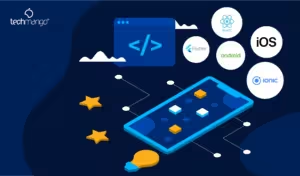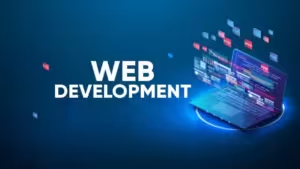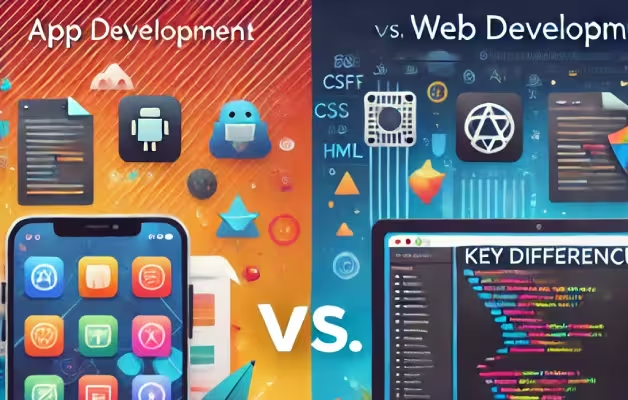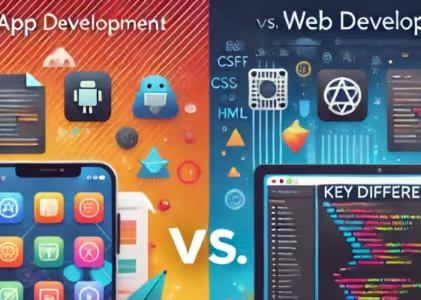Key Differences Between App and Web Development
App and Web Development Technology is rapidly changing how we learn, teach, and interact; it’s becoming increasingly valuable to know about app and web development. Whether you are a teacher looking to introduce coding into the classroom, a parent guiding your tech-savvy child, or just a curious learner;
In this article, I walk through some key differences between app and web development. By the end, you’ll understand the skills, tools, and technologies needed for both, and how they can benefit education and beyond.
What Is App Development?
Application development is the process by which software applications are made and executed on mobile devices.

Examples include smartphones and tablet computers. Apps are intended to be downloaded and installed via app stores, for instance, Google Play or Apple App Store, and mostly provide a smooth on-the-move experience.
Competencies for Mobile App Development
1. Programming Language
A programming language is a set of characters and signs that can be translated into machine-readable form to direct a computer on how to perform various functions. Examples;
- Android: Java or Kotlin.
- iOS: Swift or Objective-C.
2. User Interface Design – UI/UX
Development of beautiful and easy-to-navigate interfaces.
3. Debugging and Testing
Debugging – the process of removing errors in code – and testing to make the app bug-free on different devices.
Key Tools and Technologies
1. Development Tools
Development tools are software applications that assist programmers in building, testing, and deploying software.
- Android Studio (for developing Android).
- Xcode for iOS.
Frameworks
Frameworks are pre-built structures providing reusable components and guidelines for software development, accelerating the process.
- Flutter and React Native for cross-platform application development.
Databases
- Firebase, SQLite.
Classroom Examples
A teacher might do some app development with tools to help students make their apps, such as a custom study planner or a science project tracker.
What is Web Development?
Web development involves the creation of websites and web applications that can be accessed through browsers on any device. Unlike apps, websites don’t have to be installed; they’re hosted online and work across platforms.

Skills Required for Web Development
Programming Languages
- Front-end: HTML, CSS, JavaScript.
- Back-end: Python, PHP, Ruby.
Responsive Design
Responsive design adapts websites and applications to various screen sizes and devices, providing optimal viewing experiences.
Search Engine Optimization (SEO)
Making the site easy to find online. SEO is the practice of improving a website’s visibility on search engines like Google to attract more organic traffic.
Key Tools and Technologies
Development Tools
- Visual Studio Code, GitHub.
Frameworks
- Angular, React, Vue.js (front-end), Django, Flask (back-end).
Hosting Platforms
Hosting platforms provide the servers and infrastructure needed to make websites and applications accessible online.
Classroom Examples
Teachers can integrate web development into lessons by guiding students to create a class blog or an interactive learning portal.
App vs. Web Development: A Side-by-Side Comparison
| Feature | App Development | Web Development |
|---|---|---|
| Platform Dependency | Platform-specific (iOS, Android) | Platform-independent (browser-based) |
| Installation | Requires download and installation | No installation needed |
| Internet Dependency | Often works offline | Typically requires internet access |
| Development Time | More time-consuming due to platform-specific coding | Shorter with cross-platform coding |
| Cost | Higher since it involves more platforms. | Lower since it involves only one codebase |
Frequently Asked Questions
Which is easier to learn, app or web development?
Generally speaking, web development is easier for a beginner as it starts with simpler languages like HTML and CSS. App development requires more advanced tools and platform-specific knowledge.
Can web development replace app development?
Not quite. While web apps provide flexibility, mobile apps offer often much better performance and access to device features such as GPS and cameras.
What’s the best starting point for educators or parents?
Introduce web development first, as it is beginner-friendly and accessible using just a browser and text editor.
Quick Tips for Getting Started
For Teachers
For young students, try Scratch, while for older ones, transition to Code.org and other similar tools.
Parents
Let your kids explore free tools such as Codecademy or Khan Academy to learn to code.
Resources and Next Steps
- Beginner-Friendly Platforms: Scratch, Code.org.
- Professional Development: Explore courses on Coursera or edX.
- Advanced Tools: Download Android Studio or Xcode for app development practice.
Start small, experiment, and encourage curiosity about learning these exciting skills—whether in the classroom or at home!


